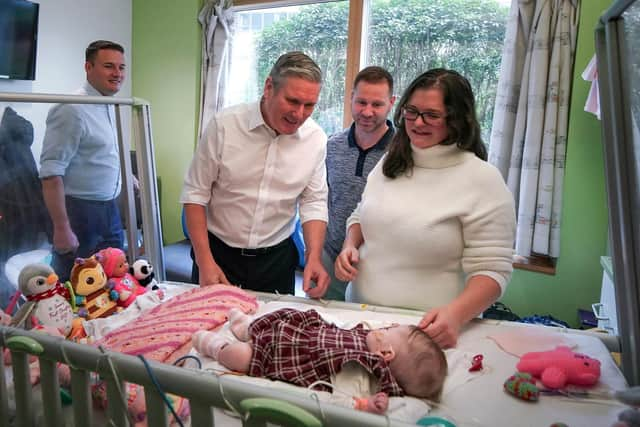Labour pledges to end 'heartbreaking' NHS waits for children
The Labour leader will today announce that his government will end waits of more than 18 weeks and “personally monitor the progress”.
The NHS constitution states that patients have a right to treatment within 18 weeks from a referral for non-urgent conditions, but this has not been met since 2016.
Advertisement
Hide AdAdvertisement
Hide AdData from the health service shows that there are more than 180,000 waits longer than this, with 18,000 waiting longer than a year.


The announcement is part of Labour’s Child Health Action Plan, aimed at creating the “healthiest and happiest generation of children ever”.
"When children are waiting over a year for treatment, that is dangerous and damaging for their long-term health,” Sir Keir said.
“Children waiting for huge proportions of their life for hospital treatment is heartbreaking, causes immense stress for their parents, presses pause on family life, and they need to end.”
Advertisement
Hide AdAdvertisement
Hide AdYesterday NHS data showed that the health service is failing to hit the majority of its performance targets, including those for cancer, despite the overall waiting list number dropping.
In England, 7.61 million treatments for 6.39 million patients were waiting to be carried out at the end of November, a fall from 7.71 million treatments and 6.44 million patients at the end of October..
The figures relation to before the most recent period of junior doctors strikes was the second month that the waiting list has fallen.
Over 11,000 people were waiting more than 18 months to start routine treatment in November, up from more than 10,500 in October.
Advertisement
Hide AdAdvertisement
Hide AdDespite the fall in recent months, the NHS waiting list remains higher than when Rishi Sunak pledged to lower it.
In January 2023, the Prime Minister made his five pledges to the nation, which included reducing the number of waits from 7.21 million.
As of November, there are 400,000 more waits for treatment, meaning that figures must fall by four times what they had towards the end of last year, with the data in December and January set to be affected by junior doctor strikes.
In addition, admissions to hospital for flu and Covid are likely to add further strain to the health service and the Prime Minister’s pledge.
Advertisement
Hide AdAdvertisement
Hide AdSarah Woolnough, chief executive of the King’s Fund, said: “Behind each of these figures is a person who is struggling to receive the timely care they need and deserve, despite the best efforts of staff.
“During this challenging winter period, the NHS is prioritising access to the most critical urgent and emergency care services.
“But pressures are widespread across the health and care system, including ongoing industrial action over NHS staff pay and working conditions impacting the speed of elective recovery.”
Downing Street yesterday said the NHS waiting list was too high but blamed striking doctors for the backlog.
Advertisement
Hide AdAdvertisement
Hide AdThe Prime Minister’s spokesman said the decrease in November, a month with no strikes, was “an illustration of the progress NHS staff can make when they don’t have to contend with industrial action”.
The Government urged junior doctors to negotiate but stressed their demand for a 35 per cent pay restoration is “not achievable”.
It has emerged that more than 113,000 operations, appointments and procedures were postponed due to the longest walkout in the history of the NHS after junior doctors in England staged a six-day walkout from January 3 to January 9.
It means a total of 1.33 million inpatient and outpatient hospital appointments have been cancelled in England since the current spell of industrial action began in the NHS in December 2022.